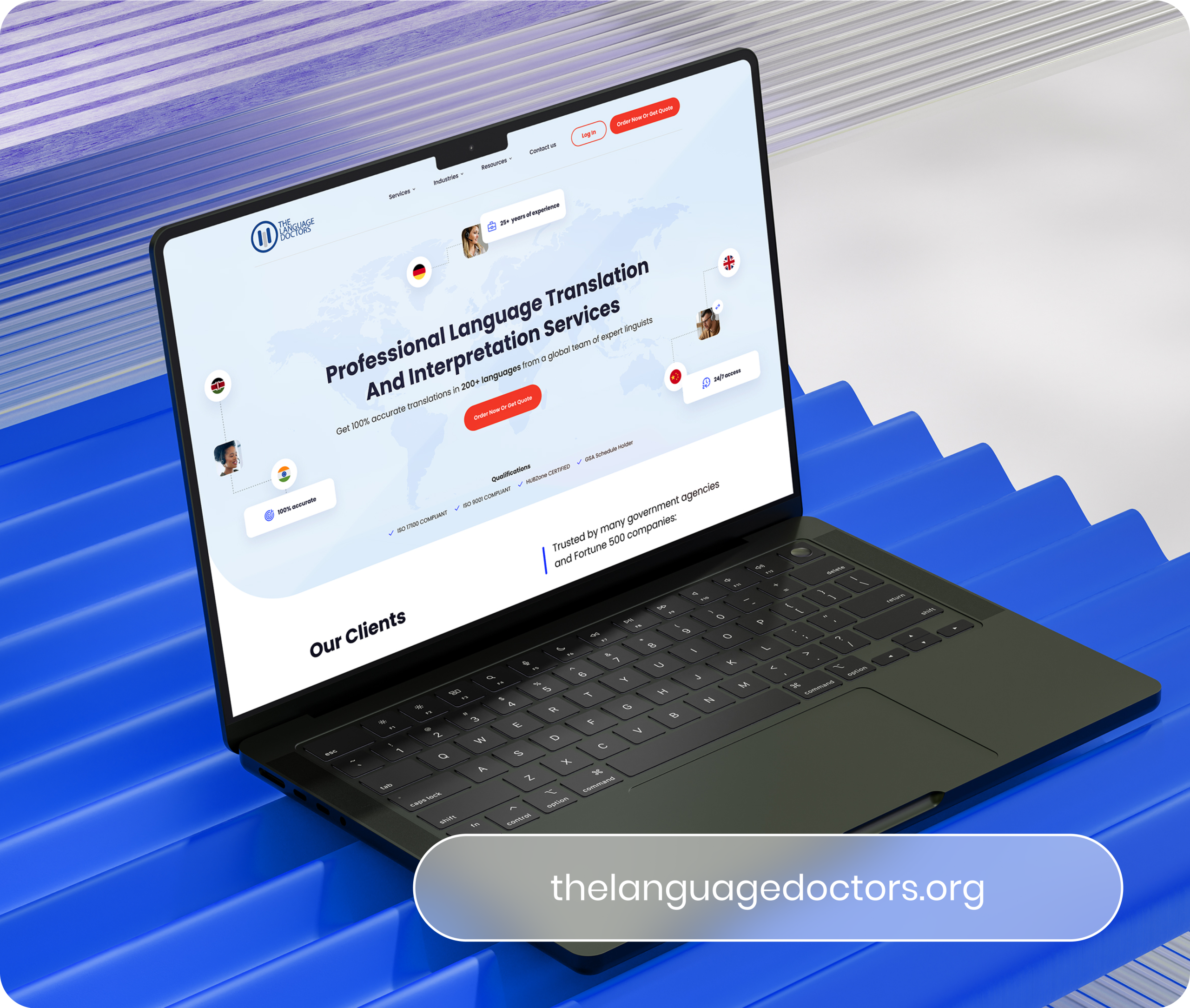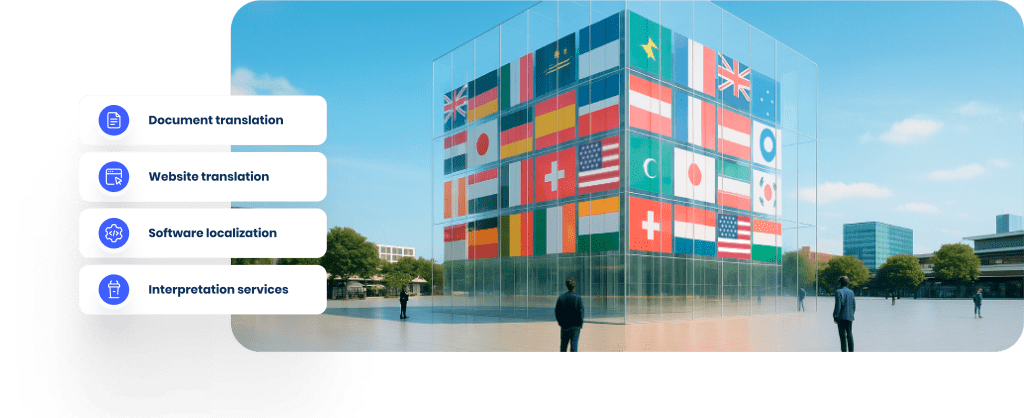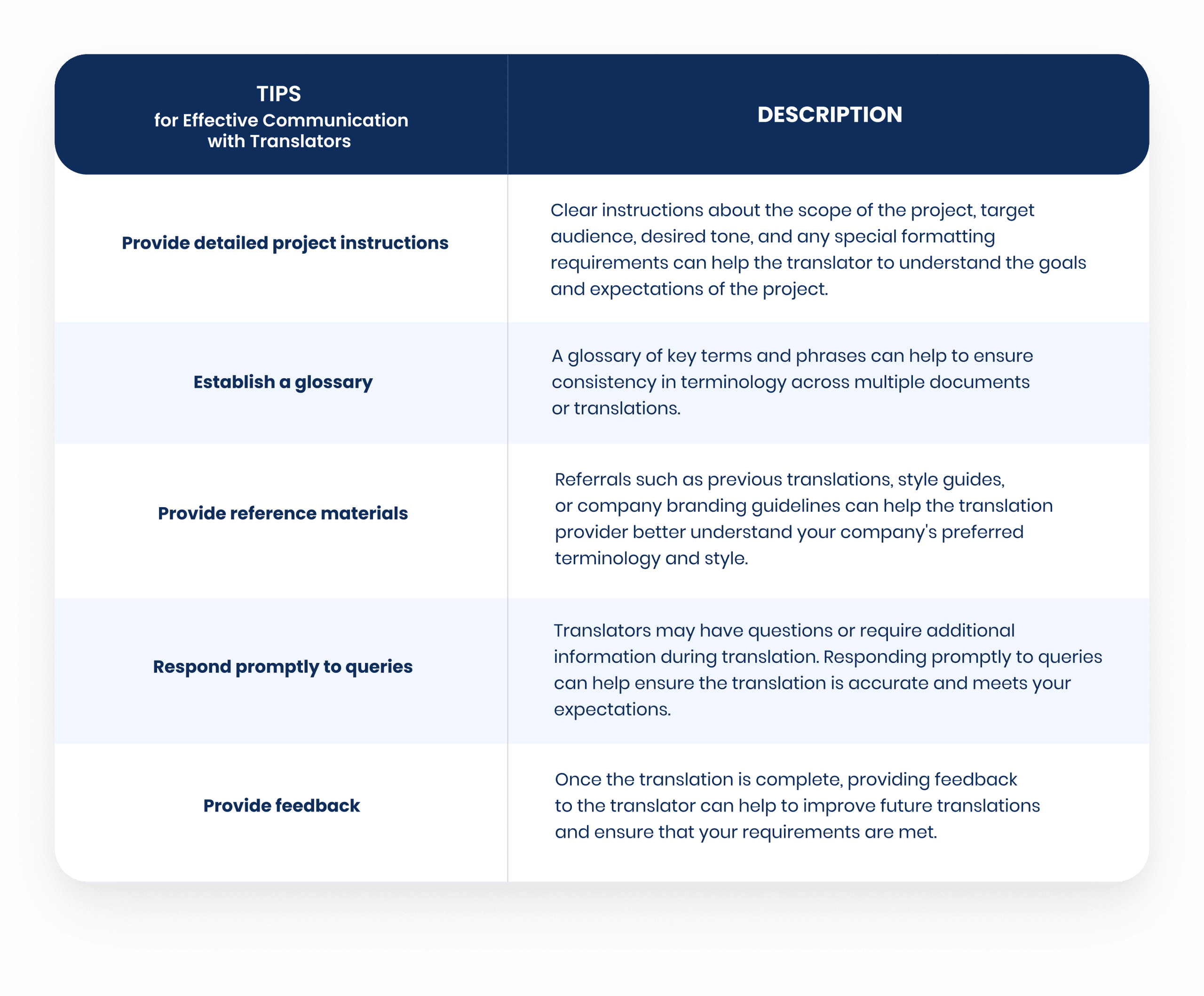Introduction
In today’s globalized world, businesses of all sizes are expanding their reach and targeting new markets. Whether you’re an established multinational corporation or a startup looking to grow your customer base, the ability to communicate effectively with customers and partners in different languages is essential to success.
Professional translation services are crucial in enabling cross-border communication and facilitating international business transactions. But with so many different translation services available, it can be difficult to know where to begin. In this guide, The Language Doctors will provide a comprehensive overview of professional translation services and help businesses decide when to select the right translation provider for their needs.

Explanation of why professional translation services are important in today's globalized world
As the world becomes more interconnected, businesses increasingly expand their reach beyond their local market to tap into global opportunities. However, this also means they face the challenge of communicating effectively with people who speak different languages and come from diverse cultures. In such a scenario, professional translation services like The Language Doctors enable cross-cultural communication and successful business partnerships.
Using automated translation tools or relying on non-professional translators may seem cost-effective, but it can lead to significant communication breakdowns and cultural missteps. In contrast, professional translation services provide accurate and culturally appropriate translations that help businesses avoid misunderstandings, build trust with their partners and customers, and ultimately achieve their global expansion goals.
This white paper will delve deeper into the importance of professional translation services in today’s globalized world and explore their benefits for businesses of all sizes and industries.
Overview of the benefits of using professional translation services
Here are some of the top benefits of using professional translation services:
- Accurate and High-Quality Translations: Professional translation services guarantee accurate and high-quality translations, which can help businesses effectively communicate with their target audience. Translators who are experts in their field and deeply understand the cultural nuances and technical terminology of the source and target language provide precise, consistent translations that convey the intended message.
- Increased Global Reach: Professional translation services help businesses reach a wider audience worldwide by enabling effective communication in their native languages. This increased reach can lead to more business opportunities and revenue growth.
- Improved Customer Satisfaction: Providing information to customers in their native language increases their understanding and trust in the business, resulting in higher customer satisfaction. Professional translation services can also help businesses avoid misunderstandings, leading to costly mistakes and damaging their reputation.
- Compliance with Local Regulations: Compliance with local regulations is crucial in many industries. Professional translation services ensure that all legal and regulatory requirements are met in the target language, avoiding legal complications and penalties.
- Cost Savings: Professional translation services can help businesses save costs by reducing the need for in-house translation resources and avoiding costly mistakes resulting from inaccurate translations.
Types of Professional Translation Services
This section will explore the different professional translation services available to businesses and organizations. Each type serves a specific purpose and can be tailored to meet the unique needs of different industries and sectors. By understanding the various types of translation services, businesses can make informed decisions about which service will best suit their needs and enable them to communicate effectively with their global audiences.
Overview of different professional translation services (document translation, website translation, software localization, interpretation, etc.)
The Language Doctors know that in today’s globalized world, businesses and organizations require a wide range of professional translation services to communicate effectively with their clients, partners, and stakeholders from different countries and cultures. These services include document translation, website translation, software localization, and interpretation.
Document translation is one of the most common types of professional translation services. It involves translating documents such as legal contracts, marketing materials, financial statements, and technical manuals. These documents often contain specialized terminology and require the expertise of professional translators familiar with the subject matter.
Website translation is another crucial service that businesses need to consider. With the growth of e-commerce and digital marketing, companies are increasingly expanding their online presence to reach a wider audience. Website translation involves translating a website’s content into different languages, adapting it to local cultural norms, and ensuring that it remains accessible and user-friendly.
Software localization is another type of translation service that is essential for businesses operating globally. It involves adapting software and applications to meet different regions and countries’ linguistic and cultural requirements. This includes translating user interfaces, menus, and messages into different languages and adapting the software to local cultural norms and preferences.
Interpretation services are crucial for businesses participating in international events, conferences, and meetings. Interpretation involves the real-time translation of spoken language into another language, allowing participants to communicate effectively and seamlessly.The Language Doctors have been on the market for over 20 years and know how important it is to meet all the client’s requirements. Because of that, we have developed a wide range of translation and interpretation services that cover most of all possible needs. Check our wide range of services here: https://thelanguagedoctors.org/services/

Explanation of the differences between the different types of services
In the previous section, we discussed the various professional translation services available to businesses and individuals. This section will delve deeper into the differences between these types of services.
Document translation involves the translation of written texts such as legal documents, technical manuals, and marketing materials. On the other hand, website translation involves translating websites and their content to enable businesses to reach a wider audience in different languages. Software localization is a specific type of translation that involves adapting software to meet a particular market’s cultural and linguistic requirements. Interpretation, on the other hand, is the process of orally translating speech from one language to another in real time.
Each type of service requires different skills and approaches, and it’s important to understand these differences when choosing the right service for your business needs. For example, while document translation requires a deep understanding of technical and legal terminology, website translation may require a more creative approach to marketing language. Software localization involves linguistic and cultural adaptation, while interpretation requires fluency in the target language and strong public speaking skills.
By understanding the differences between these professional translation services, businesses can make informed decisions about which service best suits their needs.
Before The Language Doctors start translation and interpretation, we thoroughly study your business or project to stick to your tone of voice and ensure that we deliver to the right audience. Want to see how we do it and stay updated with all our news? Follow us on LinkedIn: https://www.linkedin.com/company/the-language-doctors/
Examples of industries that commonly use each type of service
Here are some examples of industries that commonly use different types of professional translation services:
- Document Translation: Document translation services are essential for businesses in industries such as legal, financial, healthcare, and manufacturing. These industries require translating documents like contracts, legal agreements, financial reports, medical records, and product manuals.
- Website Translation: Website translation is essential for businesses in the e-commerce, hospitality, travel, and technology sectors that have a global customer base. These industries require the translation of websites, e-commerce platforms, social media accounts, and other digital content to engage with customers in their native language.
- Software Localization: Software localization is essential for technology and gaming industries that operate in various markets. These industries require translating and adapting software, apps, and video games to meet their target audience’s cultural and linguistic needs.
- Interpretation: Interpretation services are essential for hospitality, travel, and entertainment businesses. These industries require interpretation services for events, conferences, and meetings to ensure effective communication between speakers of different languages.

How to Choose a Professional Translation Service Provider
In today’s globalized world, choosing the right professional translation service provider can be crucial to the success of your business. With so many providers offering various services, selecting the one that best fits your needs can be overwhelming. This section will guide you through the important considerations when selecting a professional translation service provider and provide valuable tips to ensure you make an informed decision.
Factors to consider when choosing a professional translation service provider (quality, experience, pricing, technology, etc.)
Factors to consider when choosing a professional translation service provider:
- Quality: The quality of the translation is essential when choosing a translation service provider. Look for a provider that has a rigorous quality control process and uses native-speaking translators with subject matter expertise in your industry.
- Experience: Choose a provider with a proven track record of success. Look for experience with companies in your industry who can provide references.
- Pricing: Pricing is always an important factor to consider. However, keep in mind that quality comes at a cost. Avoid providers that offer extremely low prices, as this could be a red flag for poor-quality translations.
- Technology: Look for a provider that uses the latest technology to streamline the translation process and improve quality. Translation memory tools, machine translation, and terminology management systems can help improve accuracy and consistency while reducing costs.
- Customer service: Choose a provider that offers excellent customer service. Look for a provider with a dedicated project manager who can answer any questions and keep you updated on the status of your project.
Questions to ask potential service providers
When choosing a professional translation service provider, it’s important to ask the right questions to ensure that they can meet your specific needs. Here are some important questions to consider:
- What is your experience in the industry? Choosing a provider with a solid track record of success in the type of translation service you require important.
- What is your quality assurance process? How do you ensure the accuracy and consistency of your translations?
- What technology do you use to support your translation services? Translation memory software and other advanced technology can improve accuracy and reduce costs.
- Can you provide references or case studies from previous clients in my industry? This can give you a better understanding of the provider’s experience and success in your field.
- How do you handle confidential or sensitive information? Ensure the provider has appropriate measures to protect your data and maintain confidentiality.
Tips for avoiding common pitfalls
When choosing a professional translation service provider, there are also some common pitfalls to avoid. Here are some tips to help you make an informed decision and avoid potential mistakes:
- Don’t choose a provider based solely on price: While it’s important to keep costs in mind, choosing a provider based on price can lead to low-quality translations and misunderstandings. Look for a provider that offers a fair price and high-quality services lie The Language Doctors (you can choose either to work with our main team or choose a professional interpreter on your own).
- Ensure the provider has experience in your industry: Different industries have unique language requirements and technical jargon. Look for a provider with industry experience who can provide accurate and effective translations.
- Look for a provider with a quality assurance process: Ensure the provider you choose has a rigorous quality assurance process to ensure translation accuracy.
- Consider the provider’s technology: A good provider should have up-to-date technology to support their translation services, such as translation memory software and terminology management tools. This can improve translation accuracy and reduce costs over time.
While The Language Doctors may not meet EVERY ONE of these requirements, we still meet most of them. Security, high-quality translations, and timely delivery are our strong sides. Choose Chinese, French, Haitian, Japanese, Italian, and other translation services today: https://thelanguagedoctors.org/
Best Practices for Working with Professional Translation Service Providers
Once you have selected a professional translation service provider, it’s essential to establish an effective working relationship to ensure the best possible outcome. This section will outline some best practices for working with professional translation service providers. These practices can help you maximize the quality of your translations, ensure timely delivery, and streamline the translation process. Following these tips can set yourself and your service provider up for success.
Tips for preparing documents for translation
Preparing documents for translation can significantly affect the final quality of the translated product. Here are 2 tips to help ensure that your documents are ready for translation:
- Provide context: It is important to provide translators with as much context as possible to ensure that they understand the text’s intended meaning. This can be achieved by providing background information about the document, including the target audience, the purpose of the document, and any relevant cultural or linguistic nuances.
- Use consistent terminology: Consistent terminology is critical in ensuring accuracy and clarity in the translated text. Providing the translator with a glossary of key terms to the translator can help ensure that the terminology is consistent throughout the document.
Best practices for communicating with translators

Measuring the Success of Professional Translation Services
The success of professional translation services is determined by various factors such as accuracy, timeliness, and overall impact on business operations. Measuring these factors is essential to assess translation services’ value and identifying improvement areas. In this section, The Language Doctors will discuss key performance indicators (KPIs) and other metrics that can be used to evaluate the success of professional translation services.
Key performance indicators (KPIs) to track when using professional translation services
Here are some important KPIs to consider:
- Quality Metrics: One of the most critical KPIs to track is the quality of the translations. This can be measured through various means, such as accuracy rates, proofreading scores, and customer satisfaction ratings.
- Turnaround Time: Another essential metric to track is how quickly the translations are completed. Turnaround time can be a critical factor for some projects, and delays can lead to missed deadlines and lost revenue.
- Cost Metrics: Cost is always important when working with professional translation services. Tracking the cost per word or project can help businesses make more informed decisions about their translation needs.
- Productivity Metrics: Monitoring the translation team’s productivity can provide insight into the project’s progress.
Methods for Measuring ROI
Return on investment (ROI) is a crucial metric for businesses of all sizes. It helps companies determine the effectiveness of their investment and whether it’s generating the expected returns. Measuring the ROI of professional translation services can be challenging, but it’s crucial to determine the value they bring to your business.
Here are some methods for measuring ROI:
- Cost Savings: Calculating the cost savings of professional translation services is one of the easiest ways to measure ROI. By outsourcing translation to a professional service provider, businesses can save on hiring, training, and managing in-house translators costs. Moreover, professional translators like The Language Doctors have the expertise to deliver high-quality translations that are free of errors and culturally sensitive. This can help avoid costly mistakes that could potentially damage your reputation.
- Increased Revenue: Another way to measure ROI is to evaluate the impact of translation services on revenue. Translation services can help businesses expand their reach by breaking down language barriers and reaching new audiences. This can lead to increased sales and revenue.
- Improved Customer Satisfaction: Satisfied customers are likelier to remain loyal to a business and recommend it to others. Translation services can help businesses communicate effectively with their customers in their native language, improving customer satisfaction.
- Improved Efficiency: Professional translation services can also help improve business efficiency. By outsourcing translation, businesses can save time and resources that can be invested in other important areas of the business.
- Feedback from Stakeholders: Finally, it’s important to gather feedback from stakeholders to evaluate the effectiveness of translation services. This can help identify areas for improvement and make necessary adjustments to ensure that translation services are meeting the needs of the business.
Measuring the ROI of professional translation services requires a strategic approach and careful consideration of different factors. However, it’s essential to determine the value they bring to your business.
Examples of companies that have successfully used professional translation services
Many companies have recognized the importance of professional translation services in their global expansion strategies. By effectively communicating with customers and partners in their native languages, they have built stronger relationships and achieved better business outcomes.
One such company is Airbnb, which provides a platform for people to rent out their homes or apartments to travelers. Airbnb recognizes the importance of providing translations of its listings and other content in multiple languages and has invested heavily in professional translation services to achieve this. As a result, the company has expanded into new markets and increased its revenue.
Another example is Coca-Cola, which operates in over 200 countries and territories worldwide. Coca-Cola relies on professional translation services to ensure its branding and messaging are consistent and effective across languages and cultures to market its products in each market effectively.
Finally, Adobe’s software company has also seen success through professional translation services. Adobe provides a range of digital media and marketing solutions and has used professional translation services to localize its products and marketing content for customers worldwide. This has helped Adobe to build a strong global brand and increase its market share in many regions.
Case Studies by The Language Doctors
Case Study 1: Translation Services
Client: A Global E-commerce Company Expanding to Latin America
Challenge:
A leading global e-commerce company faced significant challenges in localizing its website, product descriptions, and marketing materials for the Latin American market. The company required high-quality, culturally adapted translations to enhance customer engagement and ensure regulatory compliance across multiple Spanish-speaking countries.
Solution:
The Language Doctors (TLD) provided professional translation services utilizing native linguists with expertise in e-commerce and digital marketing. We implemented a streamlined translation management system to facilitate content updates while ensuring brand consistency. Additionally, rigorous quality assurance checks were conducted to maintain accuracy and cultural relevance.
Results:
- Increased engagement on localized product pages.
- Improved conversion rates due to culturally adapted content.
- Faster time-to-market for new product launches across Latin America.
- Enhanced brand trust and customer satisfaction.
Case Study 2: Interpretation Services
Client: A U.S. Healthcare Provider Serving Multilingual Patients
Challenge:
A major healthcare provider struggled with communication barriers when treating limited-English proficient (LEP) patients. Medical staff required real-time interpretation services to ensure accurate diagnoses, informed consent, and patient compliance with treatment plans.
Solution:
TLD delivered on-demand interpretation services via phone and video remote interpreting (VRI), ensuring 24/7 language support. Additionally, certified medical interpreters were deployed for in-person consultations to enhance communication in critical care situations. All services were HIPAA-compliant, ensuring patient confidentiality and regulatory adherence.
Results:
- Reduced communication-related errors in patient care.
- Increased patient satisfaction and trust in medical staff.
- Compliance with federal and state language access regulations.
- Improved efficiency in patient consultations, reducing appointment times.
Case Study 3: On-Site Interpretation for USCIS Meetings
Client: Individuals Navigating USCIS Interviews and Immigration Proceedings
Challenge:
Many applicants required professional on-site interpretation services during USCIS interviews and immigration proceedings. Language barriers, legal terminology, and cultural nuances often led to delays and miscommunication, negatively impacting their cases.
Solution:
TLD provided certified on-site interpreters specialized in legal and immigration settings. Our team ensured that applicants experienced clear, accurate communication throughout their interviews, reducing misunderstandings and increasing confidence during critical legal procedures. Our interpreters adhered to strict confidentiality and accuracy standards in compliance with USCIS requirements.
Results:
- Higher success rates in USCIS interviews due to improved communication.
- Reduced stress and increased confidence for applicants.
- Faster and smoother processing of immigration cases.
- Full compliance with USCIS interpretation requirements.
Case Study 4: On-Demand Interpretation for a Medical Provider
Client: A Healthcare Facility Specializing in Cancer and Blood Disorders
Challenge:
The client frequently encountered language barriers when communicating with patients. Many LEP patients required immediate access to interpretation services, but scheduling in-person interpreters was often impractical for urgent cases.
Solution:
TLD implemented an on-demand interpretation solution featuring 24/7 phone and video remote interpreting (VRI). This enabled medical staff to instantly connect with certified medical interpreters in multiple languages, improving patient-provider communication and ensuring accurate medical care.
Results:
- Increased patient satisfaction and trust in medical care.
- Faster and more effective consultations with multilingual patients.
- Reduced administrative burden for medical staff.
- Compliance with federal healthcare interpretation requirements.
Case Study 5: Medical Translation for an EHR Company
Client: A Healthcare Technology Company Developing Electronic Health Records (EHR) Solutions
Challenge:
The client required ongoing translation services for various medical documents in multiple languages. Initially, the focus was on translating patient letters and after-visit summaries in English and Spanish, with an emphasis on maintaining accuracy and consistency across documents.
Solution:
TLD provided expert medical translation services, prioritizing compliance and clarity. Certified medical translators and interpreters reviewed and validated translations to ensure accuracy and patient-friendly language. Additionally, a quality assurance process was implemented to identify and address translation errors, improve terminology selection, and minimize patient confusion.
Results:
- High-quality, consistent translations for patient-facing documents.
- Turnaround times of one week for translation batches of 10-20 pages.
- Improved patient understanding and engagement with medical information.
- Streamlined collaboration between the EHR company’s procurement team and TLD’s translation specialists.
Summary of the key takeaways from the white paper
The globalized nature of business today makes professional translation services a critical component for effective communication across languages and cultures. Companies can reap numerous benefits by prioritizing cultural sensitivity and accuracy in translation efforts. Understanding the different types of professional translation services, such as document translation, website translation, software localization, and interpretation, is essential in choosing the right service for specific needs and industries.
Quality, experience, pricing, and technology should be carefully considered when selecting a professional translation service provider to ensure reliable and efficient translation services. Best practices for working with service providers include
- properly preparing documents for translation,
- effectively managing translation projects, and
- maintaining clear communication with translators to ensure smooth and successful outcomes.
Measuring the success of professional translation services can be achieved through tracking key performance indicators (KPIs) and measuring return on investment (ROI), enabling companies to assess the effectiveness of their translation efforts and make data-driven decisions.
Successful companies that have utilized professional translation services include Airbnb, Coca-Cola, and Adobe, which have expanded their global reach, enhanced their brand and increased their market share.
In conclusion, professional translation services are indispensable for businesses operating in a globalized world. By prioritizing accuracy, cultural sensitivity, and effective communication, companies can leverage the benefits of professional translation services to achieve business success and overcome language barriers.

Final thoughts on the importance of professional translation services
Professional translation services are crucial in facilitating communication and enabling successful business interactions in today’s globalized world. By understanding the importance of cultural sensitivity, accuracy, and effective communication in translation efforts, companies can bridge language barriers and unlock new opportunities for growth and success.
Moreover, as businesses expand their reach across borders, the need for professional translation services becomes even more pronounced. Choosing a reliable and experienced translation service provider (like The Language Doctors), preparing documents for translation, managing translation projects effectively, and maintaining clear communication with translators are essential to ensure smooth and successful translation outcomes.
Furthermore, measuring the success of professional translation services through key performance indicators (KPIs) and return on investment (ROI) allows companies to assess the effectiveness of their translation efforts and make informed decisions. Examples of successful companies that have utilized professional translation services highlight the tangible benefits of leveraging translation services for global expansion and brand enhancement.
In conclusion, professional translation services are invaluable tools for businesses navigating the complexities of a globalized world. By prioritizing accuracy, cultural sensitivity, and effective communication, companies can maximize the impact of their translation efforts and achieve business success on an international scale. Investing in professional translation services is a strategic decision that can lead to improved communication, enhanced brand reputation, increased market share, and business growth in diverse markets.

